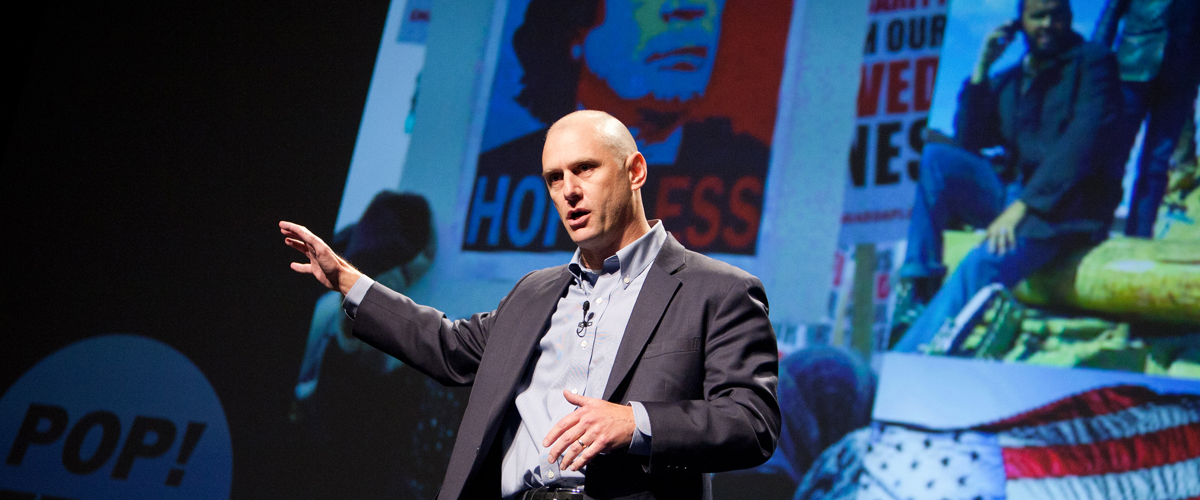WATCH: NortheasternsCOS YouTube Channel
LISTEN: Col Mark Puck Mykleby
by Angela Herring
America’s biggest national challenge today isn’t terrorism, health, or even climate change, according to retired Marine Col. Mark Mykleby, senior fellow at the New America Foundation. Nor is it competition with China, or security threats from al-Qaida or other terrorist organizations, he added. Instead, it’s how all of these things and many others contribute to global unsustainability, Mykleby said during a lecture on Tuesday at Northeastern’s Amilcar Cabral Center.
He said that in 1953, the country used a policy of containment to address its biggest challenge at the time, which was across the pond: communism. While it worked then, Mykleby said the world is much different today—and yet the United States still follows the same general approach.
“We’re so focused on threat and risk that we’re willing to sacrifice and expend our national prosperity in pursuit of security,” he said. “A security that is mostly defined by our 20th-century past, not our 21st-century reality.”
Containment, he explained, was a control strategy. It leveraged force and power and it worked because the world almost acted as a closed system back then. “You could push on certain variables toward a deterministic end,” he said. The same is no longer true today and yet we’re still pushing.
Mykleby’s lecture, entitled “Sustainability: A 21st-Century American Grand Strategy,” was hosted by the Urban Coastal Sustainability Initiative in collaboration with the Kostas Research Institute for Homeland Security. The event closely aligned with the university’s focus on use-inspired research to address very important societal problems, said Stephen W. Director, provost and senior vice president for academic affairs. “Two of those areas are sustainability and security,” he said, “and this is a combination of the two.”
Before joining the New America Foundation in 2011, Mykleby spent more than two decades with the Marine Corps, ultimately landing in the U.S. Special Operations Command developing strategy. Then, in 2009, Navy Admiral Mike Mullen, chairman of the Joint Chiefs of Staff, commissioned Mykleby and Navy Capt. Wayne Porter to develop a new grand strategy for the country.
Mykleby and Porter quickly realized, however, that the answer was not a typical strategy at all. It was a narrative about America’s place in a global strategic ecology. They ultimately completed their document, called A National Strategic Narrative.
In natural ecosystems, Mykleby explained, “Every little player inside the biosphere has got a role to play. We’ve got to start thinking about what is our role in the world.” Our new role is to take on the challenge of folding another 3 billion individuals into the global middle class as places like India and China continue to grow and consume, he said. If they follow the American paradigm, it’ll take four-and-a-half planets worth of resources to sustain us all.
Since that clearly won’t do, Mykleby and Patrick Doherty, a colleague at the New America Foundation, are developing a framework for implementing what they see as the key economic sources for a sustainable nation: walkable communities, regenerative agriculture, and resource productivity. These three, he said, directly link to the four economic sectors that reap the largest returns on investment: manufacturing, agriculture, construction, and transportation. The U.S. economy, he said, is currently focused on less productive areas such as service industries and retail.
“There’s this great quote from [the book] Beowulf,” Mykleby noted toward the end of his lecture. “It goes, ‘Behavior that’s admired is the path to power among people everywhere.’” He reflected a moment, and then said, “We’ve got to get to admirable behavior. We have to get on with the doing.”
Originally published in news@Northeastern on September 27, 2013
College of Science

